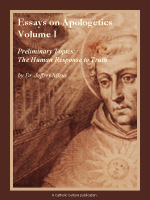
Posted on 12/02/2011 2:59:57 PM PST by NYer
| From Our Store: Essays in Apologetics, Volume I (eBook) |
What is finally emerging as the sticking point between the Vatican and the Society of Saint Pius X is the question of the assent owed to the Second Vatican Council. This is now the subject of an important essay in L’Osservatore Romano by one of the key negotiators for the Vatican, the vicar general of Opus Dei, Msgr. Fernando Ocariz. Note that there is a link to the full text at the end of our news story, which itself includes substantial quotations.
I hate to say I told you so, but Msgr. Ocariz says exactly the same thing I have been saying for years here on CatholicCulture.org. But of course this is no surprise because it is something that all faithful theologians have known from the first. Since it was an ecumenical council, meeting and promulgating its acts to the whole Church under the authority of the Pope, the Second Vatican Council’s doctrinal sentences demand assent in the following ways:
The Council itself explained this in a doctrinal comment added to the Acta in both March and November of 1964, which I took note of in the introduction to my commentary on Lumen Gentium (The Dogmatic Constitution on the Church) in my series on Vatican II (now available as an ebook). In addition, I have talked about this until my face has turned the proverbial blue—with respect to the Council itself, the Magisterium in general, and proper theological method. See, for example:
Now I grant that Msgr. Ocariz is not the only person involved in the discussions, but it obviously no coincidence that his article was published in L’Osservatore Romano immediately following the SSPX’s request for clarifications to the Doctrinal Preamble (the basis for negotiations) on this precise point.
In any case, Msgr. Ocariz has stated with admirable clarity exactly what the Church herself said at the time of the Council, exactly what the Church has understood to be the case since the Council, and in fact exactly what the Church has always believed about what constitutes a magisterial teaching and how magisterial teachings are to be received.
I am among those who devoutly hope that the SSPX can be reconciled on this point and can therefore be brought back into full communion with the Church. But make no mistake about it: This is the key question and what Msgr. Ocariz outlines is the correct answer. This is so true that how each of us answers this question of the assent due to Vatican II is one of those things—whether we consider ourselves Modernists or Traditionalists or something in between, and whether we feel ourselves beset by Church authority or feel we are allowed to go on as if nothing is wrong—it is one of those things that really does determine whether we are Catholic in name only or are (as I would hope) actually Catholic in fact.email the editor
Demanding assent to intentionally ambiguous documents from a Council whose fruits are well known is a good course for the Vatican to take in this matter?
The correct course to take is to pray and seek accurate understanding of the documents....not fight against the Authority of the Church.
PS Authority is not a dirty word....and we are ALL called to holiness.
;-)
But the AUTHORITY was never invoked. The last infallible document to come from Peter was Humanae Vitae.
But the AUTHORITY was never invoked. The last infallible document to come from Peter was Humanae Vitae.
With God’s grace, let’s focus on our own holiness. ;-)))
Holiness includes being honest about what this Council did to the Church and how worthless and confusing are its documents. Yes I have read them. They should warm your hearth. :o)
I think the Blessed Mother is our highest model of holiness. She quietly, firmly and completely followed the will of God.
And God is Truth.
Disclaimer: Opinions posted on Free Republic are those of the individual posters and do not necessarily represent the opinion of Free Republic or its management. All materials posted herein are protected by copyright law and the exemption for fair use of copyrighted works.